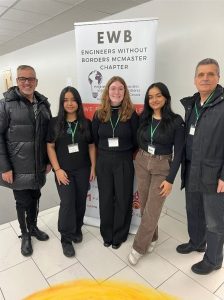31 Accessibility and Disability Inclusion in Research, Instruction, and Course-Level Enhancements
Impacts Of Recruitment and Selection Technologies That Make Use of Artificial Intelligence on Candidates with Disabilities
With her co-authors Sandra Fisher (Münster University of Applied Sciences) and Silvia Bonaccio (University of Ottawa), Catherine Connelly (DeGroote School of Business) published two open access papers on the impacts of recruitment and selection technologies that make use of artificial intelligence on candidates with disabilities. “Reactions of applicants with disabilities to technology-enabled recruitment and selection: A research agenda” was published in International Journal of Selection and Assessment, and ‘AI-based tools in selection: Considering the impact on applicants with disabilities’ in Organizational Dynamics. Organizations are increasingly using technology-enabled recruitment and selection tools such as chatbots, assessment games, and asynchronous video interviews to recruit and select employees, but the effects of these technologies on people with disabilities is rarely discussed. The research team considers the positive and negative impacts of these technologies and offers recommendations to organizations that are considering using AI-based tools for recruitment and selection.
Contributors: McMaster Organizational Behaviour Lab, McMaster Centre for Research on Employment and Work
Equity, Diversity, Inclusion and Accessibility in Welcome Week Training
The Student Success Centre (SSC) and Housing & Conference Services (HCS) provide robust online and in-person mandatory training, equipping student leaders with the necessary skills on topics related to accessibility and disability, health, safety, wellness, diversity, equity, work-life balance, empowerment and community engagement. A total of 1,193 student leaders received 33,361 hours of training. Together, partners and stakeholders use a coordinated decentralized model to streamline planning and implementation, ensuring that incoming first-year students receive an impactful experience as they transition to McMaster.
Contributors: Student Success Centre (Sean Beaudette, Adam Moniz, Katie Fitzgerald); Housing & Conference Services (Tara Roberts)
From Practice to Publication: Elevating Accessible Education as a Scholarly Pursuit
The Accessible Education Fellowship Program was a 6-month pilot initiative supporting 23 faculty and staff across 6 Faculties and 5 Central Units in designing accessibility-focused projects. Fellows explored a wide range of themes, including hyflex and lab accessibility, flexible assessments, interprofessional learning, and support for mature learners and students with disabilities. With guidance from the Accessibility in Teaching and Learning Project Team and access to institutional experts, participants received tailored consultation and professional development from colleagues in McMaster Libraries, the MacPherson Institute, and more. The program fostered a scholarly community committed to advancing accessible education and led to the creation of McMaster’s first Accessible Education Journal, with 26 submissions and inaugural publications expected in summer 2025. The co-design of the Fellowship itself demonstrated the emerging importance of accessible education as a field of academic inquiry and professional practice. Fellows reported greater confidence and recognition of their work as scholarly, pointing to a growing need for institutional structures that support accessible education innovation in both academic and administrative contexts.
Contributors: The Accessibility in Teaching and Learning Project Team, Office of the Vice-Provost, Teaching and Learning
Journey-Mapping the Experience: Instructor Voices in Accessible Teaching and Learning Design
Through a partnership between the Accessibility in Teaching and Learning STEER/R Project, Student Accessibility Services, the MacPherson Institute, and McMaster Faculties, approximately 65 faculty and instructors participated in an innovative engagement series to map their experiences navigating academic accommodations. Using process and experience mapping techniques, participants shared their course design and accommodation implementation journeys, revealing systemic barriers, communication gaps, and structural challenges that impact accessible teaching. The sessions, grounded in trust and open dialogue, moved beyond traditional training, offering immersive and reflective spaces for instructors to express concerns and build connections with accommodation and accessibility experts. These efforts produced detailed individual journey maps and a synthesized Institutional Instructor Journey Meta-Map, which visualizes common patterns, clarifies pain points, and will inform the Office of the Vice-Provost, Teaching and Learning’s 5-Year Accessibility in Teaching and Learning Roadmap. The initiative surfaced valuable insights for both service improvement and institutional planning—demonstrating the effectiveness of experience-based engagement and laying the groundwork for continued collaboration in accessibility and inclusive course design.
Contributors: The Accessibility in Teaching and Learning Project Team, Office of the Vice-Provost, Teaching and Learning
Sustainable Environment Needs to be Accessible: Understanding the Knowledge Base for Accessibility of Buildings and the Built Environment
On January 13th, 2024, Dr. Samir Chidiac participated in the EWB x MEWD Eco-Access Case Competition “Building a Sustainable and Inclusive Future” as a guest speaker with a presentation titled “Sustainable Environment Needs to be Accessible: Understanding the Knowledge Base for Accessibility of Buildings and the Built Environment”. The presentation focused on the need to emphasize inclusion and discussed the research done for achieving accessibility in the built environments in Canada.


Contributors: Prof. Chidiac’s Research Laboratory (Dr Mouna Reda, Ms. Dhwani Rao, Department of Civil Engineering)
The School of Rehabilitation Science
The School of Rehabilitation Science was funded through the Strategic Excellence and Equity in Recruitment and Retention (STEER/R) fund to develop recommendations, guidelines and tools that increase the inclusion of students with disabilities in health professional programs (HPP). We conducted a scoping review to identify strategies to increase the accessibility of HPP. Disability-related accommodation was the strategy most often cited in 234 included sources. A second strategy was for faculty and staff to engage in education, critical reflection and culture change to improve accessibility. We also surveyed clinical educators in HPP at McMaster University. Forty-three educators responded, of which 11 identified as disabled. Educators stated that a fast-paced work environment and high caseload were their greatest challenges in supporting students. With respect to needs, educators without disabilities requested information and resources to support them in the role, whereas educators with disabilities suggested broader systemic changes to normalize disability.
Contributors: The School of Rehabilitation Science (Dr. Shaminder Dhillon, Dr. Sarah Wojkowski, Dr. Dina Brooks)
